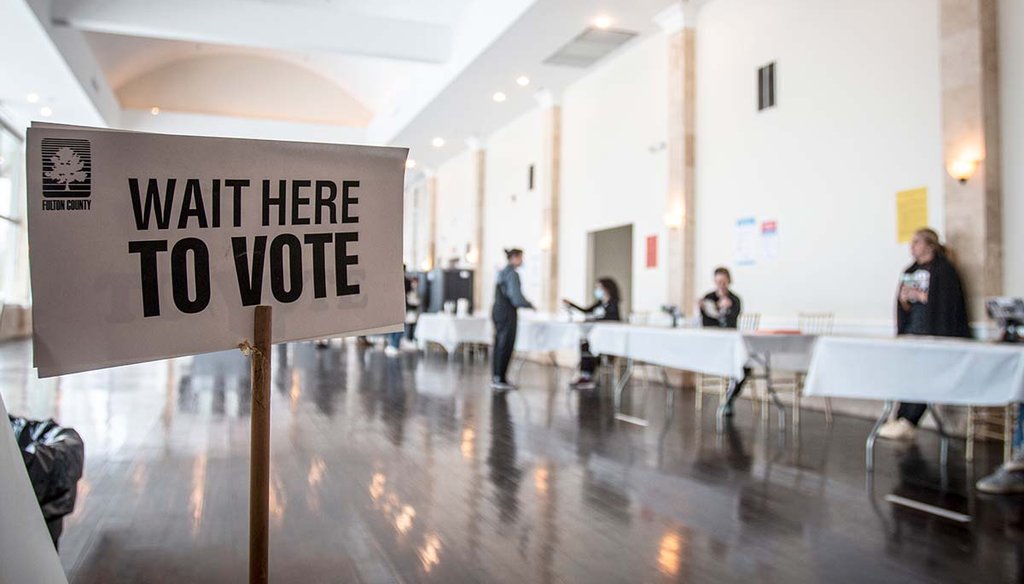Stand up for the facts!
Our only agenda is to publish the truth so you can be an informed participant in democracy.
We need your help.
I would like to contribute

Polling location workers await a rush of lunchtime voters in Georgia’s U.S. Senate runoff election on Tuesday, Dec. 6, 2022, in Atlanta. (AP)
If Your Time is short
-
Georgia law bans people from distributing or displaying any campaign material within 150 feet of the outer edge of any building within which a polling place is established. The ban extends to inside the polls and within 25 feet of voters standing in line.
-
Every state has restrictions on political activities near polling places when voting is taking place. Some states also address what apparel voters can wear inside precincts.
Many state laws prohibit people from wearing campaign T-shirts, hats or buttons inside voting sites to prevent voter intimidation. But what about political expression of a permanent nature — tattoos?
A viral video of former President Donald Trump supporters at a Georgia polling site appeared to test the rules.
The video on X showed rapper Forgiato Blow and Instagram model Claudia Rose — both in MAGA hats — speaking with a poll worker outside of a polling site in Atlanta, in Fulton County.
Blow asked the poll worker what would happen if someone entered the poll wearing something with the name of Vice President Kamala Harris or President Joe Biden.
The election worker responds "they would have to cover it up or leave" as he explains the ban of campaign materials around polling sites.
Georgia law says that no person shall "distribute or display any campaign material" within 150 feet of the outer edge of a building with a polling place. The ban extends to inside the polls and within 25 feet of voters standing in line.
The man pulled up his shorts and asked what would happen if he went inside while displaying his upper thigh tattoo of Trump’s face and "Made in America" script..
"Well, you’d have it covered," the worker responds.
Jessica Corbitt, a Fulton County spokesperson, said the poll worker was explaining the law Oct. 16 at the Ponce de Leon Library. Poll workers are trained to monitor campaign activity at polling places and address violations.
In accordance with the state law, "any display of campaign materials, including signage, clothing, pins, or body art, must be removed or covered in a polling place," Corbitt said.
Rose then asked, "So, if I go get a MAGA tattoo on my face right now and I come in here I’m just not allowed to vote?"
The worker said, "We would have to find some way of covering that."
The video then shows the woman appearing to get a black "MAGA" tattoo beneath her eye. "Got that MAGA face tatt baby, now let’s f------ go!"
Back at the polls, the worker told her to take off her MAGA hat and she walked inside. (The county has no record of people with those names on the voting rolls and said that they didn’t vote.)
Mike Hassinger, a Georgia secretary of state spokesperson, said our message was the first tattoo inquiry he has received.
"Is a tattoo campaign material? Depends on the tattoo, I guess," Hassinger said. "But just as a MAGA hat or a Harris/Walz t-shirt would be prohibited in a polling place (items also not mentioned explicitly in the code) visible tattoos that can be considered ‘campaign material’ would have to be covered up."
Every state has restrictions on political activities near polling places when voting is underway, such as limiting the display of signs, handing out campaign literature or soliciting votes within a certain distance of a polling place, according to the National Conference of State Legislatures. Some states also address what clothes voters can wear inside precincts.
Polling places are heavily regulated to preserve what the Supreme Court has called an "island of calm" for voters.
"The ballot box is one of the most powerful ways we can express our personal views and make our voices heard in this democracy," said Nora Benavidez, senior counsel at the nonprofit Free Press and on the board of the Georgia First Amendment Foundation. "Near polling locations, the presence of political support for one party or candidate — which could be inferred by signs, campaign flyers, auditory announcements, and the clothes people wear — risks influencing those about to cast their ballot, thus being subject to limitation."
Our Sources
Dom Lucre, X post, Oct. 17 2024
Georgia Election Code, Accessed Oct. 18, 2024
National Conference of State Legislatures, Electioneering Prohibitions Near Polling Places, Sept. 12, 2024
Email interview, Mike Hassinger, Georgia Secretary of State spokesperson, Oct. 18, 2024
Email interview, Jessica Corbitt, Fulton County spokesperson, Oct. 18, 2024
Email interview, Nora Benavidez, senior counsel, at the nonprofit Free Press and on the board of the Georgia first amendment foundation, Oct. 18, 2024












































